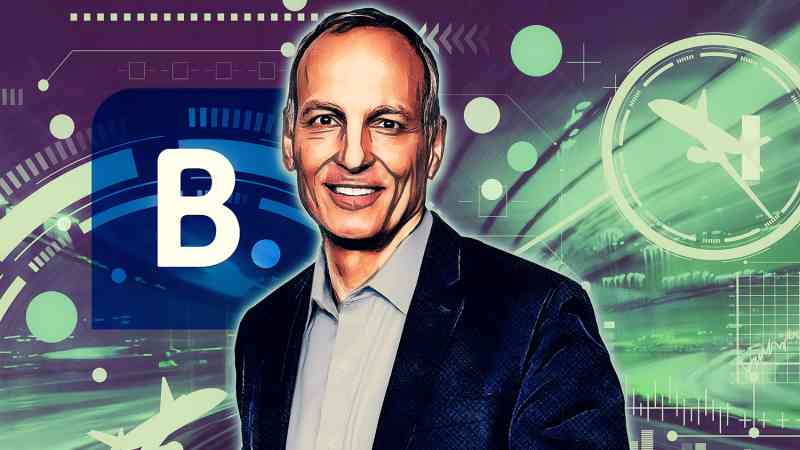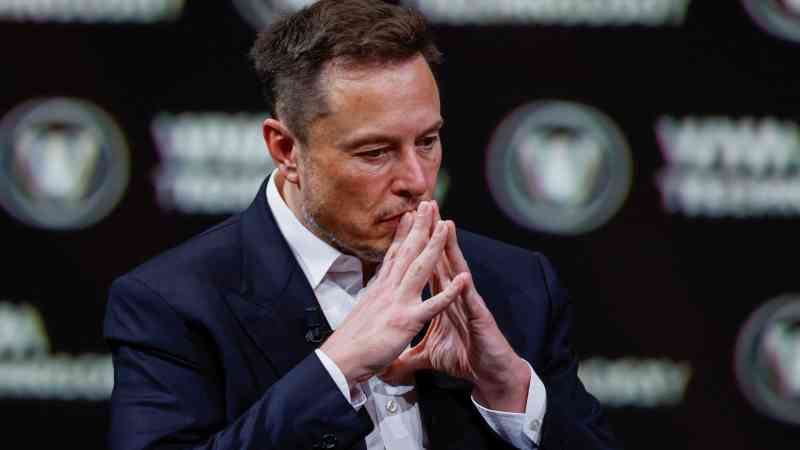Booking.com boss: AI travel agents are the future of holidays
Glenn Fogel’s life changed overnight when, aged 17, he woke up to find he was paralysed down the right-hand side of his body and unable to speak.
“Before that happened, I had been doing very well in school. I was expecting I’d soon be going to a good university,” he says. “And then I woke up one morning and things were very different.”
Within 18 months, Fogel was fully recovered from his stroke and belatedly able to attend college, but learning to talk and walk from scratch instilled a steeliness to succeed that has driven him to the top of his trade.
Now 62, he is chief executive of Booking Holdings, the US parent of Booking.com. Dominant in online travel, it is a brand that will resonate with millions around the world.
Even so, many will be surprised at Booking’s financial clout. With a $130 billion (£100 billion) stock market value, it is the world’s biggest travel company, operating across 220 countries, employing 24,000 people and offering more than 29 million listings of places to stay.
We meet in the company’s headquarters in Norwalk, Connecticut, a metropolis 50 miles northeast of Manhattan whose rows of drab, grey offices can be best described to Brits as New York’s answer to Slough.
Dressed casually in jeans and New Balance trainers, the sinewy Fogel looks as fit as a fiddle, partly due to a regimen in which he is in the gym at 5.30 every morning. A voracious reader, with the high-octane enthusiasm typical of American leaders, he’s in a particularly chipper mood. The previous day, Airbnb shares had tanked after it issued a surprise profit warning, meaning that Booking had pipped its quarterly sales growth for the 12th quarter out of the past 13.

“So I was like: ‘Yes!’,” Fogel exclaims with a fist pump. “Competition is fun, it’s good. You want to win.”
Booking’s corporate roots can be traced back to Priceline, a US website that trailblazed the “Name Your Own Price” holiday deal in the late 1990s; customers could pick a price they were willing to pay and the website would select a destination. Like so many other tech firms, its bubble burst after the turn of the millennium, with its share price plunging from $100 to just $1.
Priceline then took over the Amsterdam-based Booking.com for $135 million in 2005. It was a deal that proved pivotal, as more brands were bought to put under the Booking umbrella. The biggest deal was the $2.6 billion acquisition of restaurant booking site OpenTable in 2014. The Priceline corporate identity was swapped for Booking Holdings four years later.
Showing a rebellious streak, Fogel is carrying a takeaway coffee as he leads us into the boardroom, past a sign on the wall saying: “Strictly No Food and Drink”. He took home $47 million in cash and shares last year, making him the tenth best-paid executive on America’s S&P 500 index of publicly traded companies, but he can’t help watching the pennies. When I remark on his trendy reusable Yeti mug, selling for a crazy $38 a pop, he’s quick to point out that it was a freebie from a recent conference he attended.
“I’d never spend the money for this, versus an own-brand one that does the exact same thing,” he laughs, before complaining that he has just had to fork out hundreds of dollars for a Yeti beer-cooler backpack for his son’s 21st birthday.
A far bigger bugbear is the European Union, however.
In March this year, Booking.com had to report itself to Brussels as having met the threshold to be designated a “gatekeeper” — European Commission-speak for a company that has a potentially damaging high market share.
Its new status put in the same category as Google-owner Alphabet, Amazon, Apple, TikTok parent ByteDance, Meta — owner of Facebook and WhatsApp — and Microsoft.
As gatekeepers, they are subject to more red tape, greater scrutiny of the takeovers they are allowed to pursue, and rules that force them to make it easier for customers to move to rival services.
So it is not long before Fogel begins sounding off about a “lack of common sense” in Brussels. His beef is that in assessing Booking.com’s dominance, the EU has looked only at the online travel-intermediary market — rather than the travel market as a whole. People buy travel in many ways other than just through brokers such as Booking.com, he says; many still go direct with airlines and hotels, or through high street travel agents.
Indeed, he argues, consumers spent about $3 trillion on travel in all its forms last year, of which “only” 5 per cent, or $150 billion, was through Booking’s brands.
“Five. Per. Cent!” he says, incredulously. “It’s a blip.”
Supporters of the EU’s position argue that the regulatory crackdown is about protecting customers against getting a bad deal from monopolistic companies. Fogel, unsurprisingly, claims it is customers who will lose out. “We have to spend a lot of time, effort and money because of the regulations. And that money and efforts could go into a better service by hiring more people and building technology advancements.”
Not that Fogel isn’t investing heavily in new tech. He has an audacious plan to make the role of the human call-centre operative completely redundant. Booking is working with the US software giant Salesforce to develop artificial intelligence that will be able to address every conceivable question, query or problem from a customer.
A trial version of the technology is being tested at a number of US restaurants for when customers phone OpenTable to make simple alterations to bookings. “You are talking on the phone to an AI agent. It sounds like a person, it speaks like a person. You can’t tell it’s not a person,” says Fogel.
“The AI agent is able to solve that problem just like that,” he adds, clicking his fingers. “Because it’s not looking at a script.” It could also, conveniently, trigger a big leap in profitability.
Travel reservations are far more “complex” than restaurant ones, Fogel concedes, so will AI agents be working for all of Booking’s brands by the end of the decade? “I certainly hope… ” he starts, before tailing off as his PR minder stares daggers at him — presumably fearing that he’s about to tell me more than he’s told the stock market. “We’ll get there. I don’t know how long it’ll take,” he moderates. “I do know, though, that it is going to happen.”
Many travellers will want this tech to be rolled out sooner rather than later. Call centres and customer service rank among the top grievances with Booking.com, according to a poll of Sunday Times readers. Meanwhile, hotels are more likely to upgrade travellers to posher rooms if they book directly rather than through Booking.com, it is claimed.
The mega-trend in travel over the past decade or so has been the shift towards Airbnb-style short-term lettings. Booking.com may not be as big as its rival, whose name is now synonymous with this market, but it is getting close: 7.8 million listings compared with Airbnb’s 8 million. It generates about two thirds of Airbnb’s revenue from them.
Fogel acknowledges that there has been a backlash in many countries against the “Airbnbisation” of popular areas. Locals in British seaside towns have complained that short-term lets have driven up house prices and put locally run hotels out of business. Scotland and Wales have already clamped down on the practice, with England poised to full suit.
New York, meanwhile, has outlawed short-term lets altogether, such has been the uproar from neighbours. Fogel claims that in New York, it was a shrewd lobbying effort by multinational hotel chains that helped chase Booking.com and Airbnb out of town.
Crackdowns and heightened regulation can have unintended consequences, Fogel warns. He cites the example of New Jersey, on the other side of the Hudson river, where the Manhattan ban has merely led to even more short-term lets there. “You have a whole bunch of stakeholders and sometimes they conflict,” he says.
In the 1990s, Fogel seemed destined for a successful career in investment banking with Kidder, Peabody. But when the Boston firm hit financial difficulties and was sold to New York brokerage Paine Webber, he was made redundant.
“They fired almost all, but not all, the bankers. So you couldn’t get away with, ‘Well, they fired all the bankers,’ ” he recalls, ruefully.
He then split up with his partner, before tragedy struck when his father died suddenly of a heart attack, aged just 64. It was a sequence of events that made him reassess his life and ultimately leave banking to join Priceline in 2000 as a corporate development director. He took the helm of the corporation in 2017 and has overseen its shares more than doubling in value — this despite having to contend with the pandemic, which caused havoc in the travel industry.
Yet for all the corporate dramas, it is Fogel’s recovery from a stroke as a teenager that seems to resonate strongest in driving him forward. “I worked my ass off in university. I really did,” he says, reflectively.
But like any natural competitor, he points out that “working really hard … just gets you to the starting gate. I have been extremely lucky. And that’s the most important thing.”





Post Comment